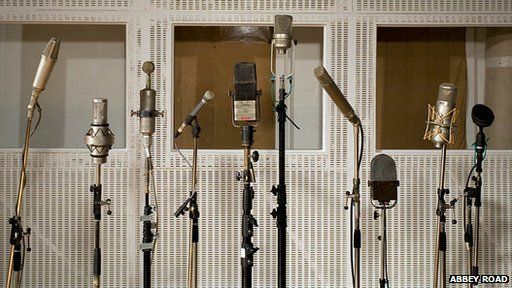When vintage tech makes modern music
- Published

While many singers rush to adopt the latest software to create tracks that sell millions, recording studios are finding that an older-school hardware approach to music production remains in demand.
Rihanna's single Umbrella, which reached number one in the US and UK charts in 2007, is reported to include a loop from Apple's Garageband music creation software, which is freely included in Apple's operating systems.
The software contains synthesised instruments, beats and loops which can be mixed and sampled freely.
Artists like Courtney Love, Nine Inch Nails and Erasure are also said to have embraced it, offering up their own music to be remixed on it by fans.
But traditional studio recording and mixing equipment is far from being on the scrapheap, say industry experts.
Studio secrets
"There's a classic microphone called a Neumann U47 that was made in the 50s, people still ask for it because they want the sound they got back then," said mastering and remastering expert Peter Mew, who has worked at Abbey Road since 1965.
"They like that vocal sound, it's almost distorted, there's a gritty punchy sound to it that's caused by the microphone. They're very expensive as they aren't made any more - but we bought a lot of them back in the day."
Tim Vine-Lott, technical director at Air Studios, founded by The Beatles' original producer Sir George Martin, confessed that engineers still have a very big soft spot for old fashioned audio tape.
"We have an Ampex ATR 102, a two-track tape machine, that people still prefer to mix to. Most engineers will stay completely digital until they want to mix and then throw out to tape," he said.
The ATR 102 was discontinued in 1982 but is still treasured by sound engineers around the world. Air Studios, whose clients include George Michael, Radiohead and the Black Eyed Peas, has four of the vintage machines, which would not look out of place on the set of an Austin Powers movie.
"We spend a lot of time scouring the world for spares," admitted Mr Vine-Lott.
"Getting tape is awkward. You can buy a hard drive for £100 - you could record 96 tracks on that. Or you can spend £250 on a 10.5in (26.7cm) diameter tape - you get about 15 minutes."
It's not just the preferred option of the studio engineers.
Knob appeal
"Clients like the sound of tape on some things," said Mr Vine-Lott. "Sometimes we bounce off it just to get the tape sound."
Musician John Maxwell-Hobbs, musician and former producer/director at The Kitchen studios in New York, believes the appeal of older equipment is that it is so much more tactile than a touch screen or a computer keyboard.
"To be able to grab hold of handles or knobs on a mixing desk you don't even have to look at them, you know where they are," he said.
"Rewinding a tape, you can physically see how much tape there is left... we are tactiley orientated."
Electronic drum kits still sell because of their physical appeal, he added.
"Every music shop has them, it's because it feels good to be bashing at something," he said.
Treasure hunt
Electronic engineer Richard Barrie once found himself restoring an original mixing desk from Virgin Manor Studios in Oxford, which composer Mike Oldfield used to his make his seminal album Tubular Bells on in 1973.
"Mike wanted to recreate the guitar sound," said Mr Barrie, who eventually found the desk in a barn, covered by straw and with the motherboard hacksawed in half.
"They weren't considered to be valuable," he said of the old kit. "They would just be dumped, or bits would be sold off."
He managed to restore it enough to help out Mike Oldfield, but says it was too expensive to fix in its entirety.
"Every year I get it out and have a look at it and think, 'I should really do something about that'," he said.
Restorations can take years as sound enthusiasts painstakingly try to track down long since discontinued parts - some more basic than others.
Even resistors and capacitors are increasingly difficult to get hold of as modern kit is surface mounted.
But is it worth it?
"It's like buying a vintage car," said Mr Barrie.
"Modern cars are great but when a vintage car is working well, it's such a lot of fun."
- Published8 June 2012
- Published12 September 2012